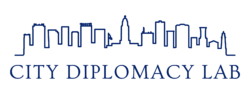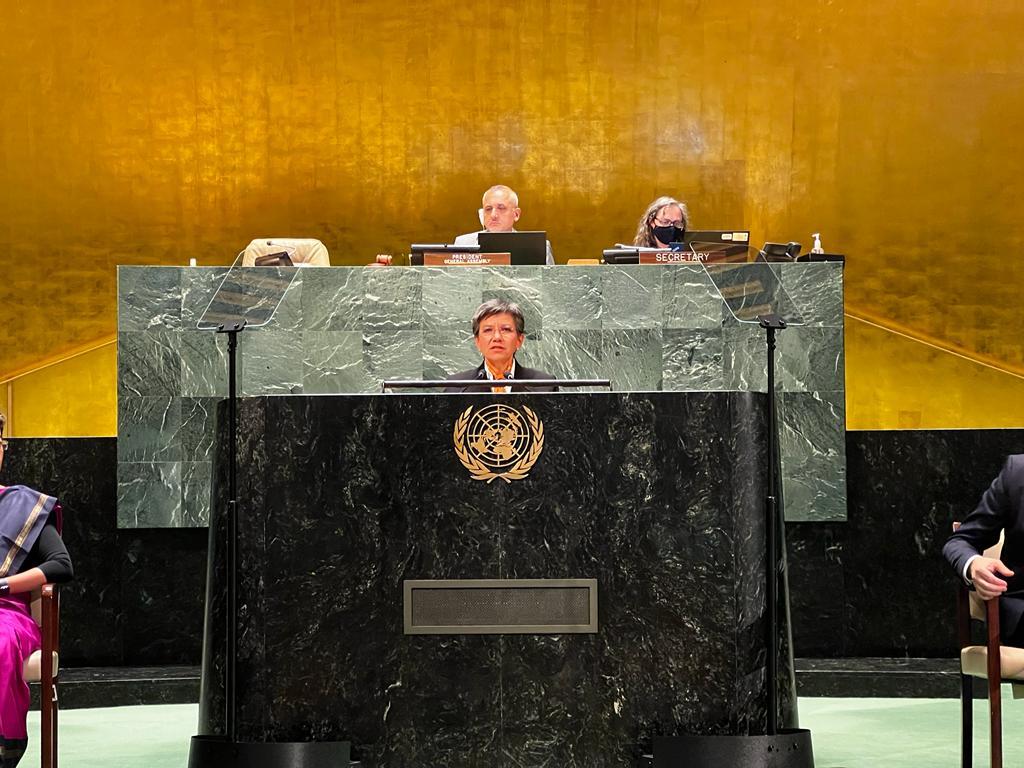-
Cities and Climate Solutions | Waste
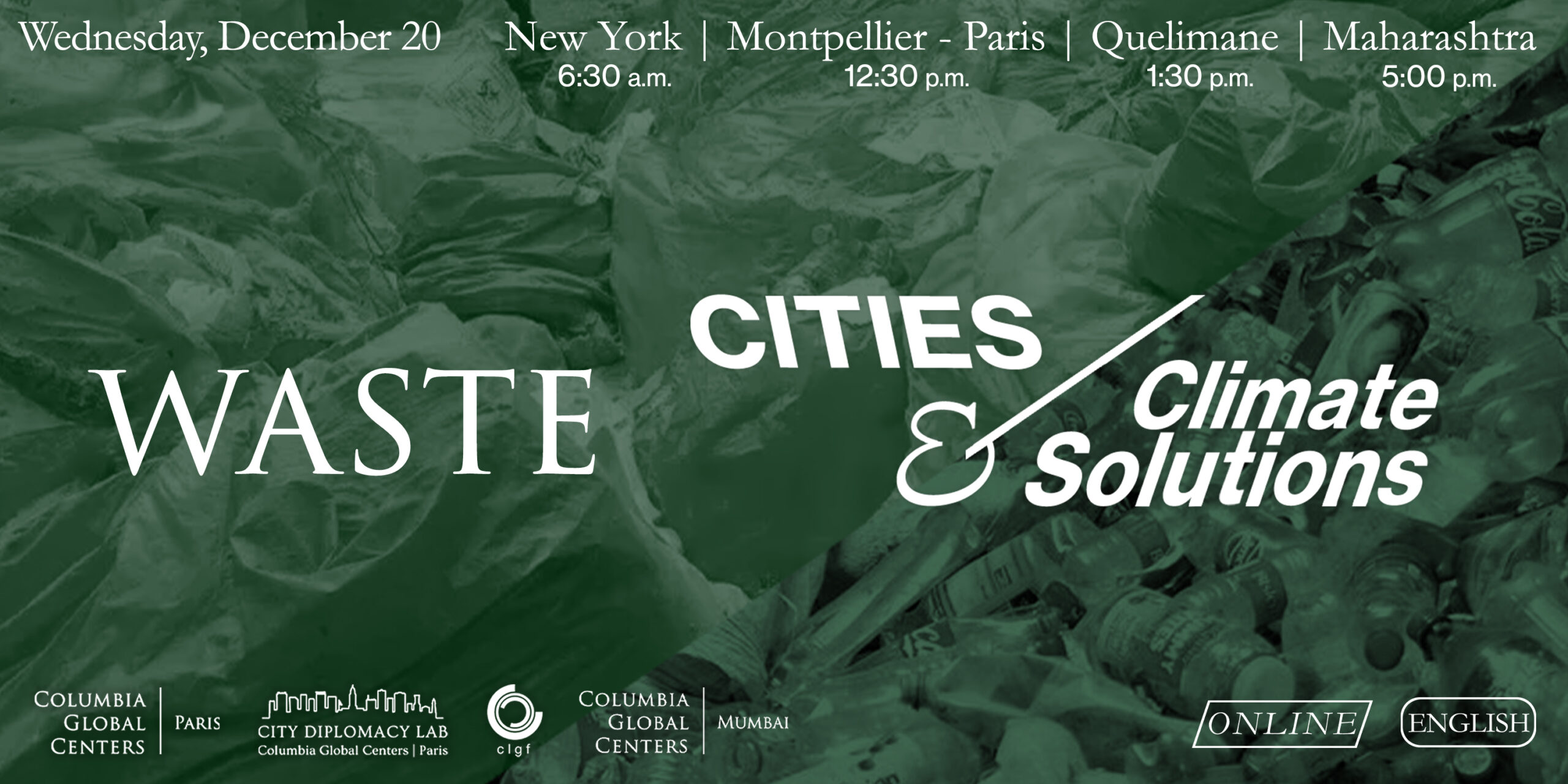
Webinar | December 20, 2023 | 6:30 a.m. New York | 12:30 p.m. Paris – Montpellier | 1:30 p.m. Quelimane | 5:00 p.m. Maharashtra
Waste management represents a major challenge to the sustainable development and health of urban communities worldwide. Long considered simply something to dispose of, waste is increasingly becoming a cornerstone of ambitious urban sustainability strategies. According to the principles of circularity, waste management makes it possible to reduce air, water, and soil pollution, foster equity and economic growth, strengthen urban-rural bonds, and improve public health.
Through the accounts of Quelimane in Mozambique, Montpellier in France, and the State of Maharashtra in India, the Cities and Climate Solutions | Waste webinar will explore and discuss the challenges and opportunities of urban waste management, drawing valuable insights for cities around the world.
The Cities and Climate Solutions webinar series is co-organized by the City Diplomacy Lab and Columbia Global Centers | Paris. This webinar is co-sponsored by the Commonwealth Local Government Forum (CLGF).
Speakers
Quelimane
Dr. Manuel A. Alculete Lopes de Araújo has been the Mayor of Quelimane since 2011. Dr. de Araújo’s extensive experience spans civil society, academics, business, and politics. He is deeply involved in advocating for issues linked to urban and climate change. He plays a key role within institutions such as UCLG as well as ICLEI, where he is a member of the Global Executive Committee and Global Co-Chair for Resilience. In 2019, Araújo was elected Deputy Chair of the National Council of the Mozambican Mayors Association (ANAMM) Congress. Araújo holds a PhD from the University of East Anglia and an MSc from SOAS, University of London.
Maharashtra
Mr. Sameer Unhale is the State Joint Commissioner of Municipal Administration, Government of Maharashtra. Currently, he is working on digital transformation and data initiatives, affordable housing, and issues relating to the larger urban areas. He has worked in the executive/leadership position of Municipal Commissioner of Municipal Corporation in the cities of Ulhasnagar, Dhule, and Nanded. Mr. Unhale wrote several books, including How will India solve its urban problems: stories of innovation, sustainability, inclusion and smartness (co-authored with Dr. Biniti Singh, October 2020), and City Reflection : Practitioner’s Experience in Urban Governance amidst Uncertain Times (October 2022).
Montpellier
Ms. Clare Hart, Vice-President of Montpellier Méditerranée Métropole. A social change maker and expert in Corporate Social Responsibility, London-born Clare Hart is passionate about gender equality and social inclusion through grassroots mobilization and a fervent charity activist. She is Vice-president of Montpellier Méditerranée Métropole for European and International Relations and a City councilor for Montpellier alongside Mayor Michaël Delafosse.
The discussion will be moderated by City Diplomacy Lab Director Lorenzo Kihlgren Grandi.
Watch the recording
Overview of the Cities and Climate Solutions series
In the face of the climate crisis, cities across the world are emerging as integral problem-solvers in the development of an effective, multi-layered response. This series, launched in Spring 2023 with events on food and water, aims to bring together the representatives of cities that have implemented some of the most impactful and sustainable actions.
This second season of the webinar series kicked off in November 2023 and covers the topics of air, energy, and waste. Each webinar will see the participation of representatives from three cities and will be moderated by a representative from Columbia University. In order to encourage geographic representativeness, each webinar will host city representatives from different regions and countries.
This series celebrates the leadership of cities and provides inspiration for the thousands of cities and local governments around the world committed to shaping the global response to climate change.
Earlier Cities and Climate Solutions webinars:
Food (Spring 2023) – https://youtu.be/3OzxcUFOYA8
Air (Fall 2023) – https://youtu.be/H_n-ddT6gJw?si=v2O74Iph3sk894-S
Energy (Fall 2023) – https://youtu.be/TD7odDcFRgA?si=6nhC5BnfN083_fQb
-
Cities and Climate Solutions | Energy
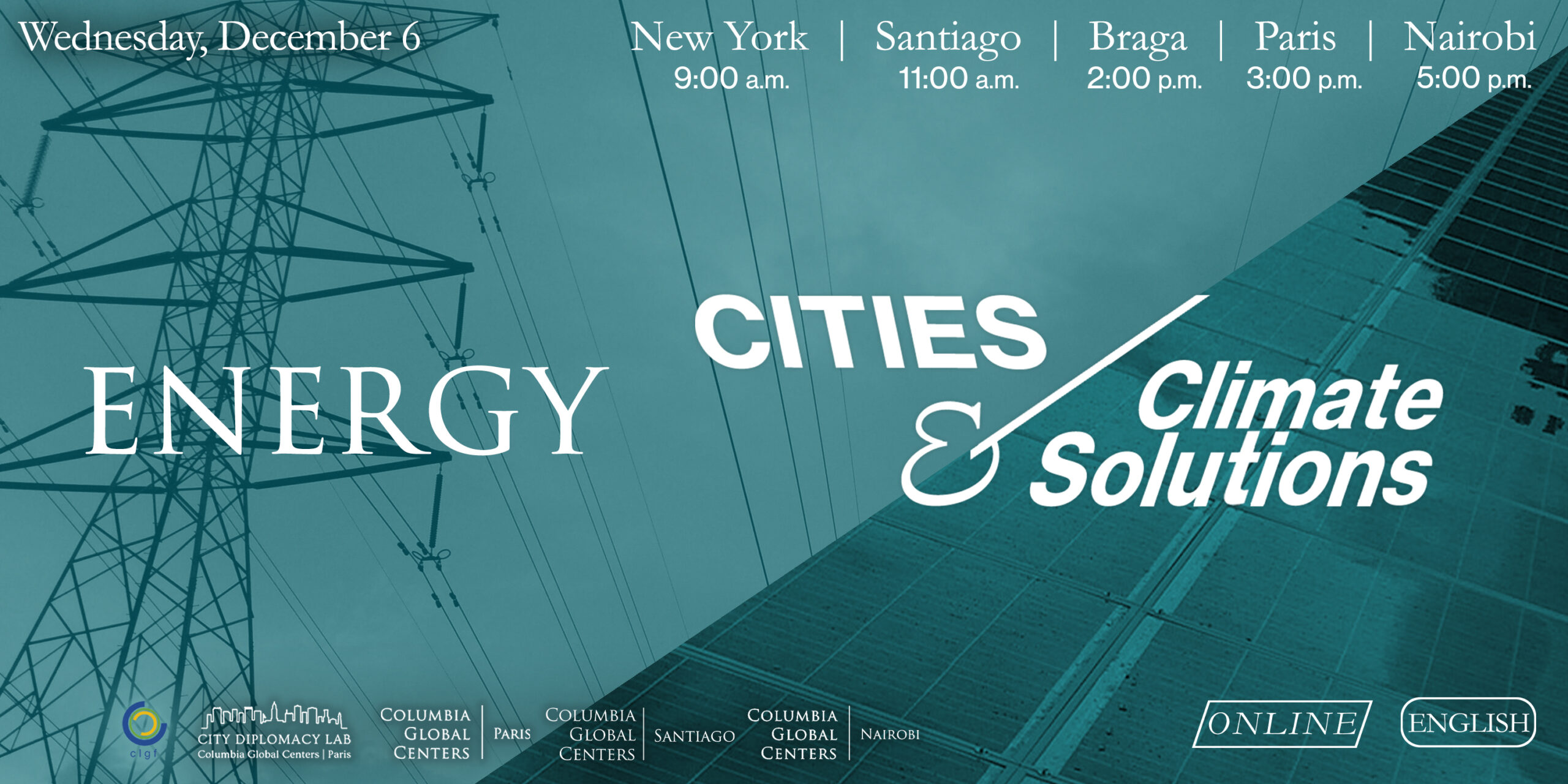
Webinar | 9:00 a.m. New York | 11:00 a.m. Santiago | 2:00 p.m. Braga | 3:00 p.m. Paris | 5:00 p.m. Nairobi
The Cities and Climate Solutions webinar series is co-organized by the City Diplomacy Lab and Columbia Global Centers | Paris.
This webinar is co-sponsored by Columbia Global Centers | Nairobi, Columbia Global Centers | Santiago, and the Commonwealth Local Government Forum (CLGF).
This webinar brings together representatives from Santiago, Braga, and Nairobi to discuss the topics of energy poverty, urban renewable energy, building energy regulations, energy retrofit, and just transition. The discussion will be moderated by City Diplomacy Lab Director Lorenzo Kihlgren Grandi.
Overview
In the face of the climate crisis, cities across the world are emerging as integral problem-solvers in the development of an effective, multi-layered response. The Cities and Climate Solutions series, launched in Spring 2023 with events on water and food, aims to bring together the representatives of cities that have implemented some of the most impactful and sustainable actions.
This second season of the webinar series kicked off in November 2023 and covers the topics of air, energy, and waste. Each webinar will see the participation of representatives of three municipalities and will be moderated by a representative from Columbia University. In order to encourage geographic representativeness, each webinar will host city representatives from different regions and countries.
This series celebrates the leadership of cities and provides inspiration for the thousands of cities and local governments around the world committed to shaping the global response to climate change.
Speakers
Braga
Hélder Costa’s mission is to support organizations, both public and private, in incorporating sustainability principles and values, ensuring that they conduct their activities responsibly, become more competitive, and promote innovation and sustainable development. To achieve this, he draws upon the knowledge acquired throughout his career, serving as a researcher in the development of sustainability assessment methodologies for university campuses and as an advisor to the Vice Presidency for Infrastructure and Sustainability at the University of Minho. The university was recognized in 2017 among the top 50 in the world in this field. Currently, he is a member of the Office to Support the Presidency at the Municipality of Braga, supporting the city’s sustainable development strategy. He holds a degree in Civil Engineering with a specialization in Hydraulics and Environment. Recently, he completed a postgraduate program in Management Control and Strategic Execution at Porto Business School, an institution where he has been a speaker at events related to Sustainable Development. He was identified in the list of ‘100 Oportunidades,’ a project by Global Shapers Lisbon of the WEF.
Nairobi
Ibrahim Otieno is the county Chief Officer in charge of Environment, Climate Change, and Natural Resources. Previously, he was the Deputy Director of Environment in charge of waste management. He holds an MA in Environmental Planning and Management (UoN), BA (Geography & Environmental Studies, UoN), Post Grad Dip-Green & Circular Economy (DTU, Denmark) and Water Sector Governance & Operations (CHU, Denmark).
Santiago
Mauricio Fabry is a veterinary doctor from the University of Concepción with studies at the University of California and Adolfo Ibáñez University. He is currently a doctoral candidate in the Doctorate program in Biodiversity Management and Conservation at the Universidad Santo Tomás de Chile. Mauricio worked for 18 years at the Santiago Metropolitan Park, of which he was its director for 7 years. He led the Ecoparque project at the Ministry of Housing and Urban Planning. He is currently Head of the Department of Environment, Biodiversity and Climate Action in the Metropolitan Regional Government of Santiago.
Moderator
Dr. Lorenzo Kihlgren Grandi is the founding director of the City Diplomacy Lab. He is a lecturer in City Diplomacy at Columbia Undergraduate Global Engagement (UGE | Paris), Sciences Po – PSIA, and École Polytechnique. He regularly advises international organizations, national governments, city networks, and municipalities on how to fully unfold the added value of city diplomacy. Author of City Diplomacy (Palgrave Macmillan, 2020), he holds a dual PhD in Political Theory from École des Hautes Études en Sciences Sociales (EHESS, Paris) and Libera Università Internazionale degli Studi Sociali (LUISS, Rome).
Watch the recording
The views and opinions expressed by speakers and guests do not necessarily reflect the official policies or positions of City Diplomacy Lab and Columbia Global Centers | Paris.
-
Interview with Luz Amparo Medina Gerena, Bogotá’s Head City Diplomat
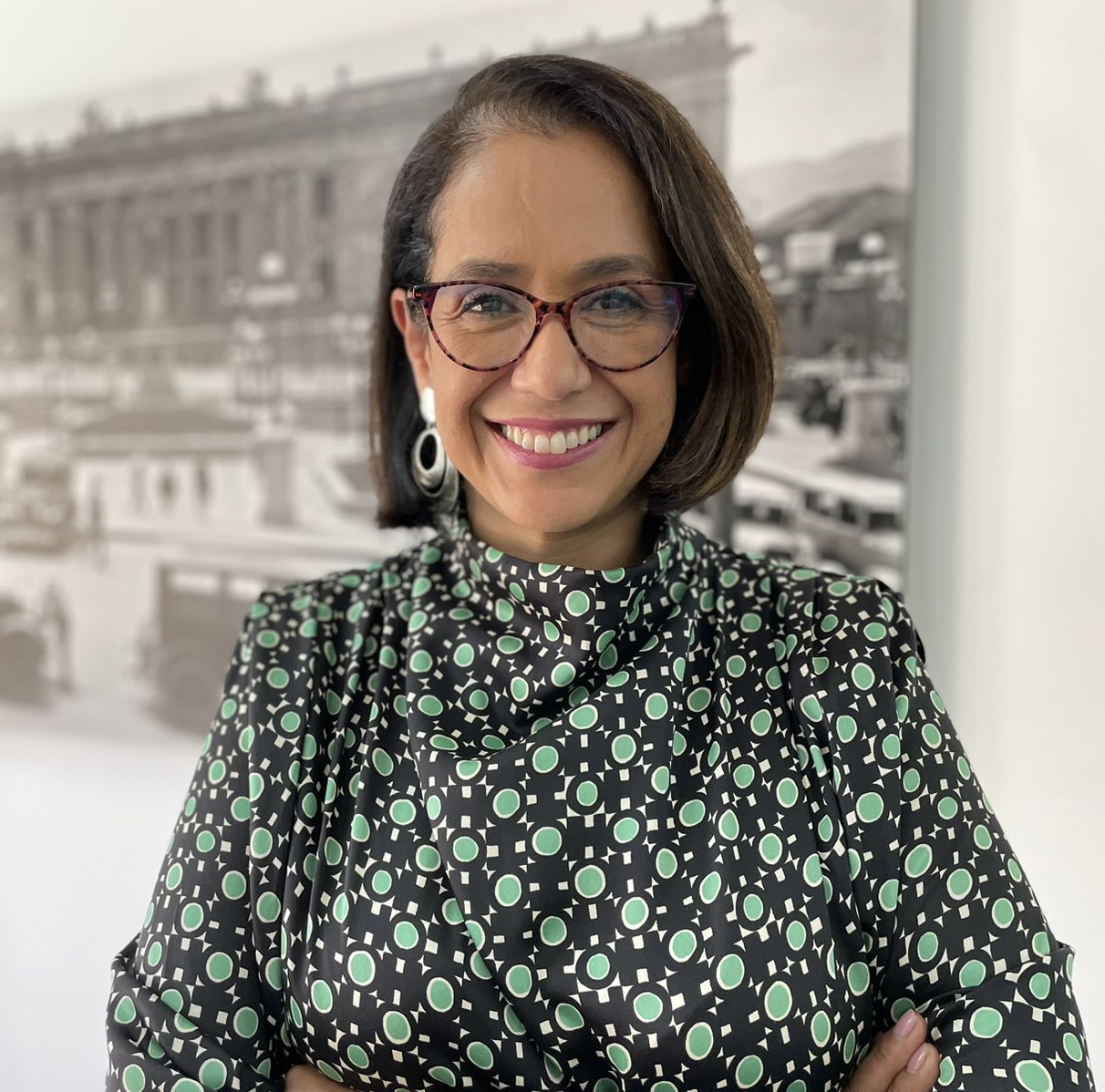
What does it mean to lead the international relations of a global city? What are its main challenges, lessons learned, and rewards? Our new series on chief city diplomats opens with an interview with Luz Amparo Medina Gerena, Director of the Office of International Relations in Bogota and Member of the City Diplomacy Lab Advisory Board.
What path led you to become a city diplomat?
This experience in Bogotá was my first experience in city diplomacy. I had previously worked at the national level in various diverse sectors such as culture, education, science, technology, and disaster risk management within the field of international relations. I also worked for intergovernmental organizations, such as the United Nations Development Program and the General Secretary of the Organización de Estados Iberoamericanos (OEI) in Madrid. So, while I had a strong background in international relations, the opportunity to engage in city diplomacy arose with the election of Claudia López as Mayor of Bogotá. She invited me to be part of her team, and it has been one of the greatest experiences and honors of my professional career. I must acknowledge, though, that I did not have significant prior experience in the field of City Diplomacy until this opportunity came along.
What was the most complex challenge you faced as the director of Bogotá’s International Relations Office, and how did you deal with it?
My job entails a constant problem-solving attitude. The success of city diplomacy in materializing international partnerships comes with a never-ending series of challenges of different natures and scales. However, perhaps the most challenging task I faced in this position was during the first year of our term in office in 2020. The COVID-19 pandemic hit only two months after the start of Mayor López’ mandate. In that context, the office of international relations had to provide information to the Mayor and her cabinet to inform two parallel processes. On the one hand, the response to a global pandemic in a city like Bogotá, home of 8 million people and that holds relevant competencies in the sanitary system, required close consultations with cities around the world to confront a challenge that humanity had never experienced before. At the same time, we also engaged in international benchmarking for the design of the Development Plan of Bogotá, which was approved in June 2020 by the city council. So, the first semester of 2020 was a very challenging time for all of humanity, for this office, and for me as the director. Meeting the demands at these two complex and intense levels was perhaps the greatest challenge. It required mobilizing resources and knowledge, as well as engaging in crosscutting interactions with the entire administration. However, the role of global relations at the local government level truly made a difference in terms of saving lives through the measures implemented and became an opportunity to gain legitimacy within the administration.
What is the most treasured moment in your city diplomacy career?
I am fortunate enough to have led a team that accomplished numerous milestones through rigorous international action over the past four years. A significant achievement in city diplomacy was the compromise we reached with Guangzhou’s authorities to have a shared term for Metropolis’ Presidency in 2021. The two cities agreed on splitting the three-year term into two periods of 18 months for each city, something the network had never done before. This involved not only engaging with all Western countries’ cities supporting Bogotá but, particularly, speaking with cities in Asia and Africa that supported Guangzhou’s candidacy. The campaign triggered truly enriching conversations conducted virtually amid the pandemic. Securing that Presidency, even if shared, was very exciting, especially because it was achieved after negotiations with a city that had been working towards it for more than six years. Metropolis is an interesting political and technical platform to foster interactions between metropolitan spaces around the world. Bogotá’s innovative approach to the creation of its own metropolitan region was positively impacted by its role in the network but also influenced the discussion on the challenges and opportunities of collaboration between different levels of government.
Another highly exciting moment for me as a city diplomat was Mayor López’ intervention at the United Nations in April 2022, in the framework of the convening to assess the progress in the implementation of the New Urban Agenda (NUA). She was designated as one of the four voices of local governments from around the world to report on the challenges, opportunities, and difficulties in implementing the New Urban Agenda. I will never forget the image of her addressing the United Nations General Assembly, calling for the recognition of local governments as the key implementers not only of the NUA but also of the main global development agendas such as the SDGs and the Paris Agreement. Her approach, which is based on caring for the people, democracy, and the planet, I believe, truly resonated with the audience. This opportunity consolidated her role as a strong voice from the cities of the Global South and paved the path to her designation as UN-Habitat Ambassador for the New Urban Agenda in the framework of the World Urban Forum held in Katowice in the summer of 2022.
In your opinion, how will the work of city diplomats evolve in the coming years?
I believe we need to understand the context we are immersed in today. There is a profound questioning of the effectiveness of the multilateral state-based system that emerged after World War II. There is a growing comprehension that there are other actors implementing global development agendas beyond nation-states. These actors include not only local governments but also representatives from the private sector and civil society. In these diverse entities, we find the ones that make things happen.
In that sense, I believe that the role of city diplomacy or, more precisely, the global action of subnational governments, will have a significant opportunity to have a much stronger presence and voice in the multi-level and multi-actor global conversation in the coming years. Perhaps, city diplomacy will even become a formal dimension of a renewed multilateral system. I think the goal of this process is to influence and contribute to transformative actions to address the global climate and social crises by creating opportunities, especially for young people and women, and ultimately contributing to greater well-being in societies. I believe that the global action of local governments will play a leading role in many of these transformations in a world shifting from highly vertical power structures to more horizontal ones. In this horizontal landscape, local governments are likely to become more important and relevant for global development.
Therefore, city diplomats will play a substantial role in facilitating the integration of global perspectives into local processes and, at the same time, impacting local policies from global trends. In times of wars led by national states, city diplomats should be open to keeping the conversation at the local level and preserving channels of dialogue in an increasingly multi-polar and diverse world.
What advice would you offer those wanting to pursue a career as a city diplomat?
As I mentioned before, in a rapidly changing world, cities are key implementers of the global agendas. Professionals entering city diplomacy will need to balance soft skills with technical knowledge. They must acquire and maintain a constant willingness to learn sectoral matters essential for the implementation of global agendas with the instruments local governments can provide. A minimum capacity to understand the specifics of the different sectors is necessary, and this requires an open mind to get acquainted with new knowledge and perspectives.
Unlearning is also crucial; we must learn to adapt because the world is changing rapidly, and technologies are advancing. What is valid today may not be tomorrow, and this speed of change will progressively increase.
I also believe that new professionals will need to develop a certain level of resilience to frustration and detachment from results. As city diplomats, we serve as facilitators between global stakeholders and local government officials. Often, outcomes and impacts do not depend directly on our performance but on sectoral servants responsible for program design and implementation.
Furthermore, developing an interdisciplinary approach to our work is essential. If this is not provided by academic training, professionals must have an open disposition to cross knowledge, disciplines, and information in real time. Collaboration is the backbone of city diplomacy. If there is no collaboration or potential for collaboration, city diplomacy loses its meaning. Therefore, city diplomats need an attitude that facilitates and smooths the work within the local government, with different levels of government, and other cities and international stakeholders. Through this collaboration, collective action can be leveraged to positively impact the significant challenges humanity faces today.
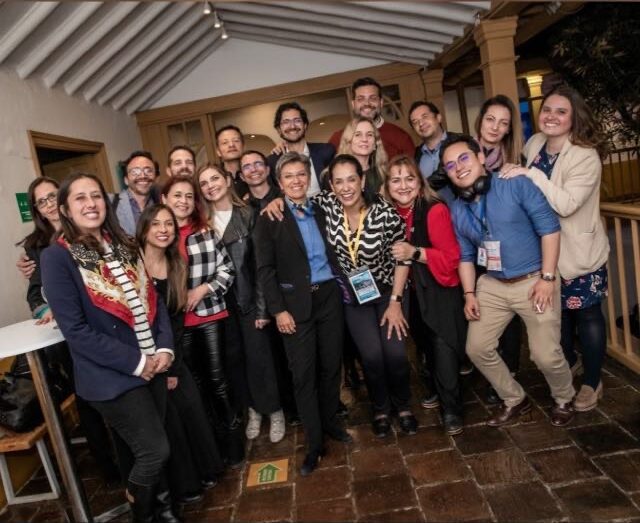
Mayor Claudia López and Luz Amparo Medina Gerena with Bogotá’s International Relations team
Watch the interview with Mayor Claudia López
-
Migration and city diplomacy: empowering cities on the Central Mediterranean Route
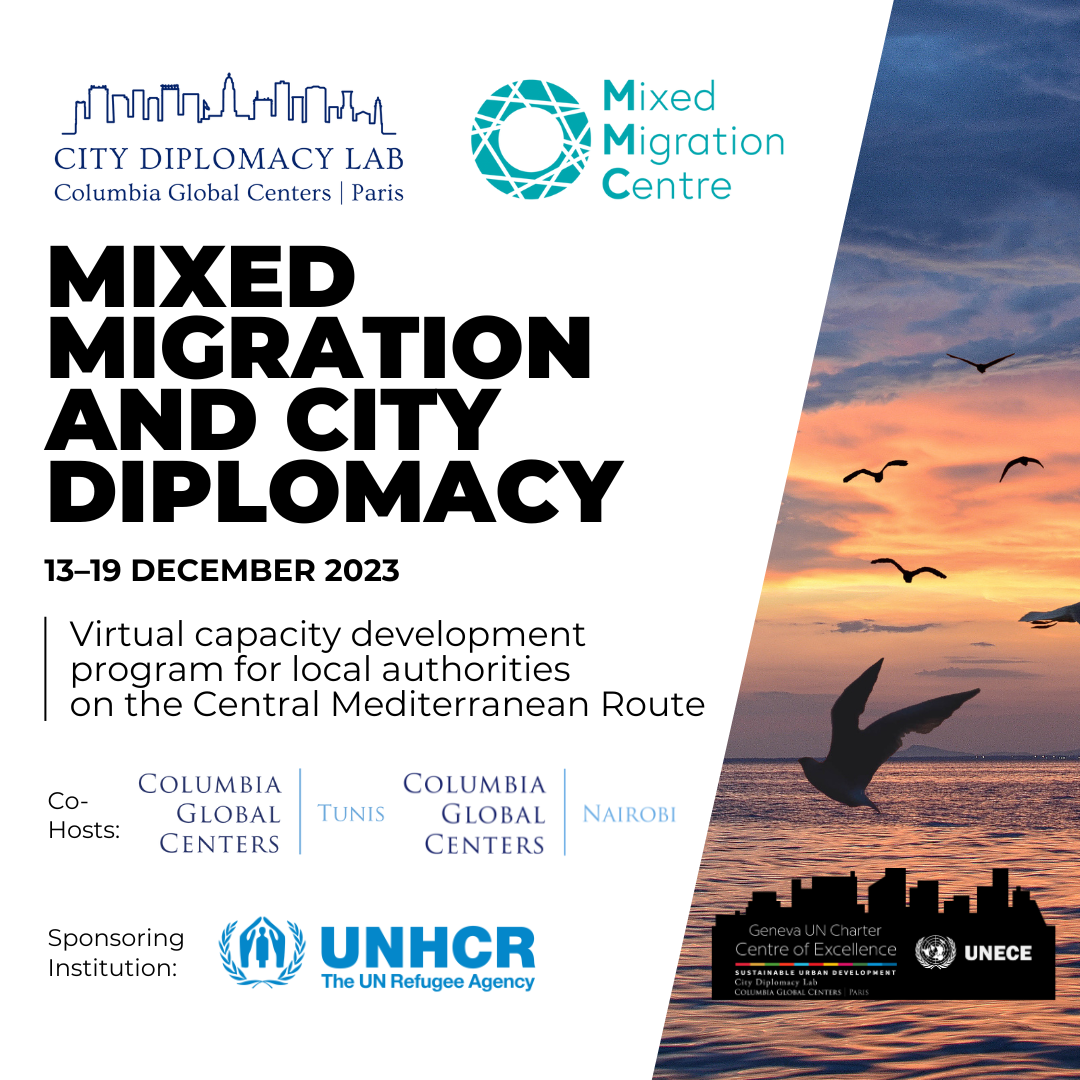
From December 13 to 19, the City Diplomacy Lab, in partnership with the Mixed Migration Centre and Columbia Global Centers in Paris, Tunis, and Nairobi, will empower cities on the Central Mediterranean Route through this highly interactive virtual training on mixed migration and city diplomacy. Participating municipal officers will be supported in developing their own action plans for mixed migration and for working along the Central Mediterranean Route.
- Participants: this free training is open to municipal officers from cities in countries along the Central Mediterranean Route*. Participants who attend at least 80 percent of the course will receive a certificate of completion.
- Dates: 13, 14, 15, 18, and 19 December 2023, 9:00 a.m. to 1:00 p.m. CET.
- Format: highly interactive virtual training featuring classes, group work, and guest lectures.
- Language: the training will be conducted in English.
- Deadline: applications must be submitted through the form below by Monday, December 11.
Course description
Mixed migration refers to cross-border movements of people, including refugees fleeing persecution and conflict, victims of trafficking, and people seeking better lives and opportunities. Motivated to move by multiple factors, people engaged in mixed migration have different legal statuses as well as a variety of vulnerabilities. In an increasingly urbanized world, cities are at the forefront of mixed migration. This applies whether refugees and migrants transit cities or settle in them for longer periods of time. Despite cities not having clear mandates on migration issues and raising funds for migration programming, local authorities, national governments, international organizations, and international policy processes are increasingly recognizing the importance of working at the city level to advance protection and solutions for refugees and migrants. This course shall explore: What does it mean for cities to work on issues of mixed migration and to work along migration routes? What are the various types of activities that cities can undertake? What tools, partnerships, and other resources are available? At the end of this one-week intensive course, city actors will be supported in developing their own draft action plans for mixed migration and for working along the Central Mediterranean Route.
The training is co-organized by City Diplomacy Lab and Mixed Migration Centre.
It is jointly hosted by Columbia Global Centers | Paris, Columbia Global Centers | Tunis, and Columbia Global Centers | Nairobi.
Institutional donor: United Nations High Commissioner for Refugees (UNHCR).
Registration is now closed
* The training is open to municipal officers in the following countries: Algeria, Burkina Faso, Cameroon, Chad, Côte d’Ivoire, Djibouti, Egypt, Eritrea, Ethiopia, Gabon, Guinea, Guinea Bissau, Italy, Kenya, Libya, Mali, Malta, Mauritania, Morocco, Niger, Nigeria, Rwanda, Senegal, Somalia, Spain, Sudan, The Gambia, and Tunisia.
-
Cities and Climate Solutions | Air
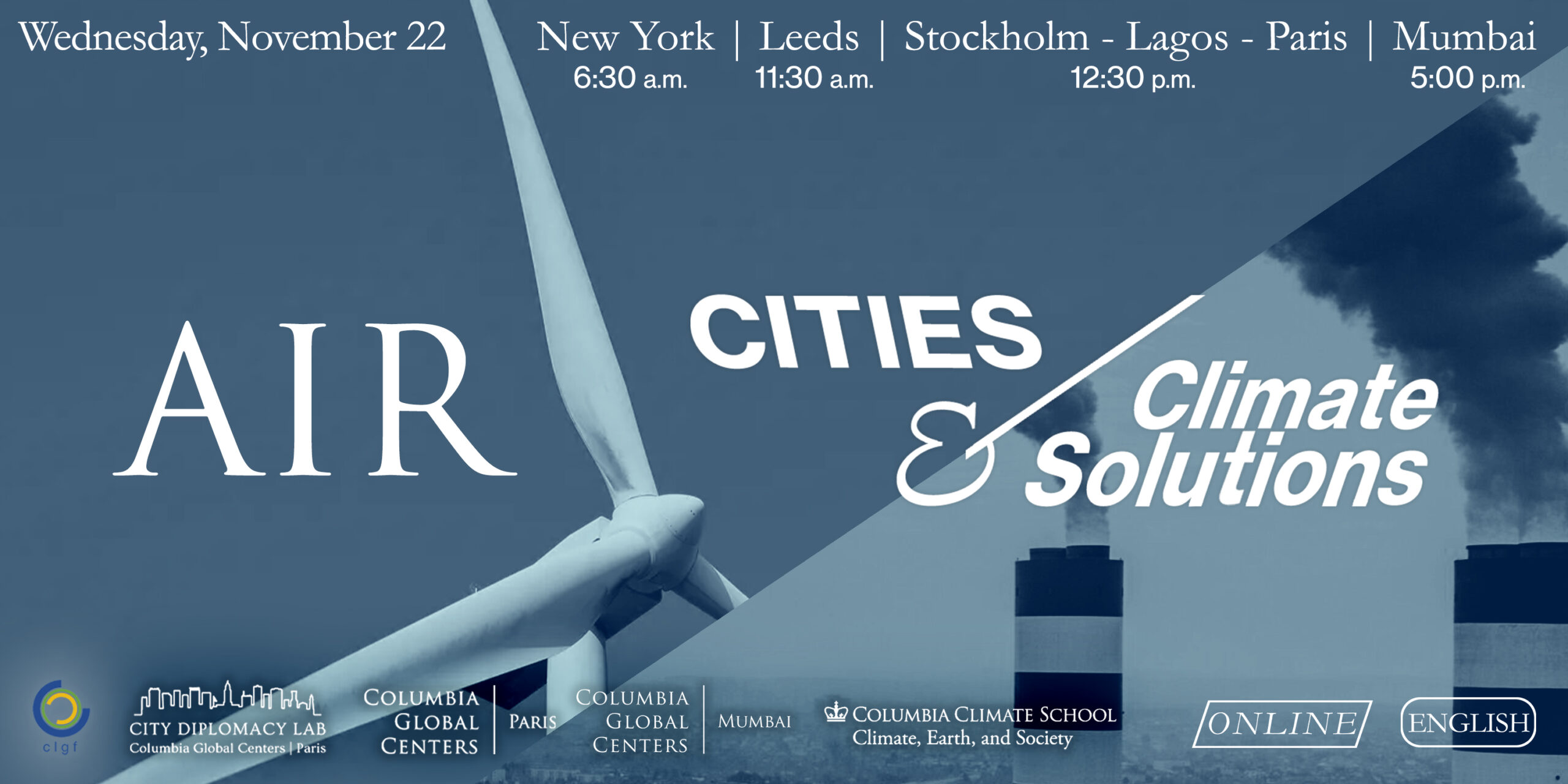
Webinar | 6:30 a.m. New York / 11:30 a.m. Leeds / 12:30 p.m. Paris, Lagos, and Stockholm / 5:00 p.m. Mumbai
The Cities and Climate Solutions webinar series is co-organized by the City Diplomacy Lab and Columbia Global Centers | Paris.
This webinar is co-sponsored by the Columbia Climate School, Columbia Global Centers | Mumbai, and the Commonwealth Local Government Forum (CLGF).
This webinar brings together representatives from Lagos, Leeds, Mumbai, and Stockholm to discuss the topics of air pollution, local public health, carbon neutrality, climate budgets, and equity and inclusion.
Overview
In the face of the climate crisis, cities across the world are emerging as integral problem-solvers in the development of an effective, multi-layered response. The Cities and Climate Solutions series, launched in Spring 2023 with events on water and food, aims to bring together the representatives of cities that have implemented some of the most impactful and sustainable actions.
This second season of the webinar series will kick off in November 2023 and will cover the topics of air, energy, and waste. Each webinar will see the participation of representatives of three municipalities and will be moderated by a representative from Columbia University. In order to encourage geographic representativeness, each webinar will host city representatives from different regions and countries.
This series celebrates the leadership of cities and provides inspiration for the thousands of cities and local governments around the world committed to shaping the global response to climate change.
Speakers
Lagos | Babatunde Ajayi – General Manager, Lagos State Environmental Protection Agency (LASEPA). Dr. Babatunde Ajayi is a systems efficiency expert and a Public Health Physician with training and experience in the epidemiology of disasters. A public health fellow of Erasmus Mundus, Dr. Babatunde Ajayi obtained his Bachelor of Medicine and Surgery (MBBS) degree from the Lagos State University before proceeding to the Catholic University of Louvain, Belgium, where he obtained a Master’s in Public Health and subsequently a Master’s in Business Administration at Warwick Business School.
Leeds | Andrew Hickford – Senior Project Manager in Sustainable Energy & Air Quality, Leeds City Council. Mr. Hickford works in Leeds City Council’s Climate, Energy & Green Spaces service which has responsibility for their Climate Emergency program that includes energy purchase and generation, decarbonization, air quality, tree planting, and energy-efficient corporate buildings. He leads across a range of areas, including fleet decarbonization, supporting the delivery of one of the largest ZE fleets in the country, as well as working to encourage ZE uptake across the city and region. He also delivers EV infrastructure, working on charge point delivery for their fleet in addition to working on public charging facilities, delivering a 100+ unit rapid charge network across the region, Leeds schemes in residential areas, across their council estate and hub provision, including Park & Ride locations including solar generation and on-site battery storage. He has responsibility for the Leeds Air Quality strategy and delivery of the action plan for improvement and also engagement and works with the Combined Authority on Transport decarbonization, EV, and air quality strategy development.
Mumbai | Revati Shidhaye – Assistant Engineer, Environment Dept, BrihanMumbai Municipal Corporation. Ms. Shidhaye works in the Environment Department of BrihanMumbai Municipal Corporation. They work in tandem with the Pollution Control Board for monitoring and mitigation measures for air pollution. With concerned departments, they also coordinate funds received from the Central Government for drinking water improvement, sanitation facilities, re-usage of sewer water, and solid waste management.
Stockholm | Magnuz Engardt – Environmental Analyst, Environment and Health Administration, City of Stockholm. Dr. Engardt has a Ph.D. in meteorology. He has worked with air pollution and climate throughout his scientific career. His present position is with the Environment and Health Administration in Stockholm, where he focuses on urban air pollution. Prior to that, he spent 20+ years at SMHI (the Swedish Meteorological and Hydrological Institute) working with regional air pollution. Engardt’s experience is mainly in the field of modeling and covers the cycling of acidifying and eutrophying species, near-surface ozone, and particulate matter.
Moderator / Dr. Lorenzo Kihlgren Grandi is the founding director of the City Diplomacy Lab. He is a lecturer in City Diplomacy at Columbia Undergraduate Global Engagement (UGE | Paris), Sciences Po – PSIA, and École Polytechnique. He regularly advises international organizations, national governments, city networks, and municipalities on how to fully unfold the added value of city diplomacy. Author of City Diplomacy (Palgrave Macmillan, 2020), he holds a dual PhD in Political Theory from École des Hautes Études en Sciences Sociales (EHESS, Paris) and Libera Università Internazionale degli Studi Sociali (LUISS, Rome).
Watch the recording
Upcoming Cities and Climate Solutions Events:
Wednesday, December 6, 3:00 p.m. (CET): Energy
Key topics: just transition, energy poverty, urban renewable energy, building energy regulations, energy retrofit.
Participating cities: Braga, Nairobi, Santiago.
Wednesday, December 22: Waste
Key topics: waste management, waste reduction, waste valorization, public health, circular economy.
—
View the Spring 2023 conversation on Food at https://youtu.be/3OzxcUFOYA8
The views and opinions expressed by speakers and guests do not necessarily reflect the official policies or positions of City Diplomacy Lab and Columbia Global Centers | Paris.
-
Happy World Cities Day!
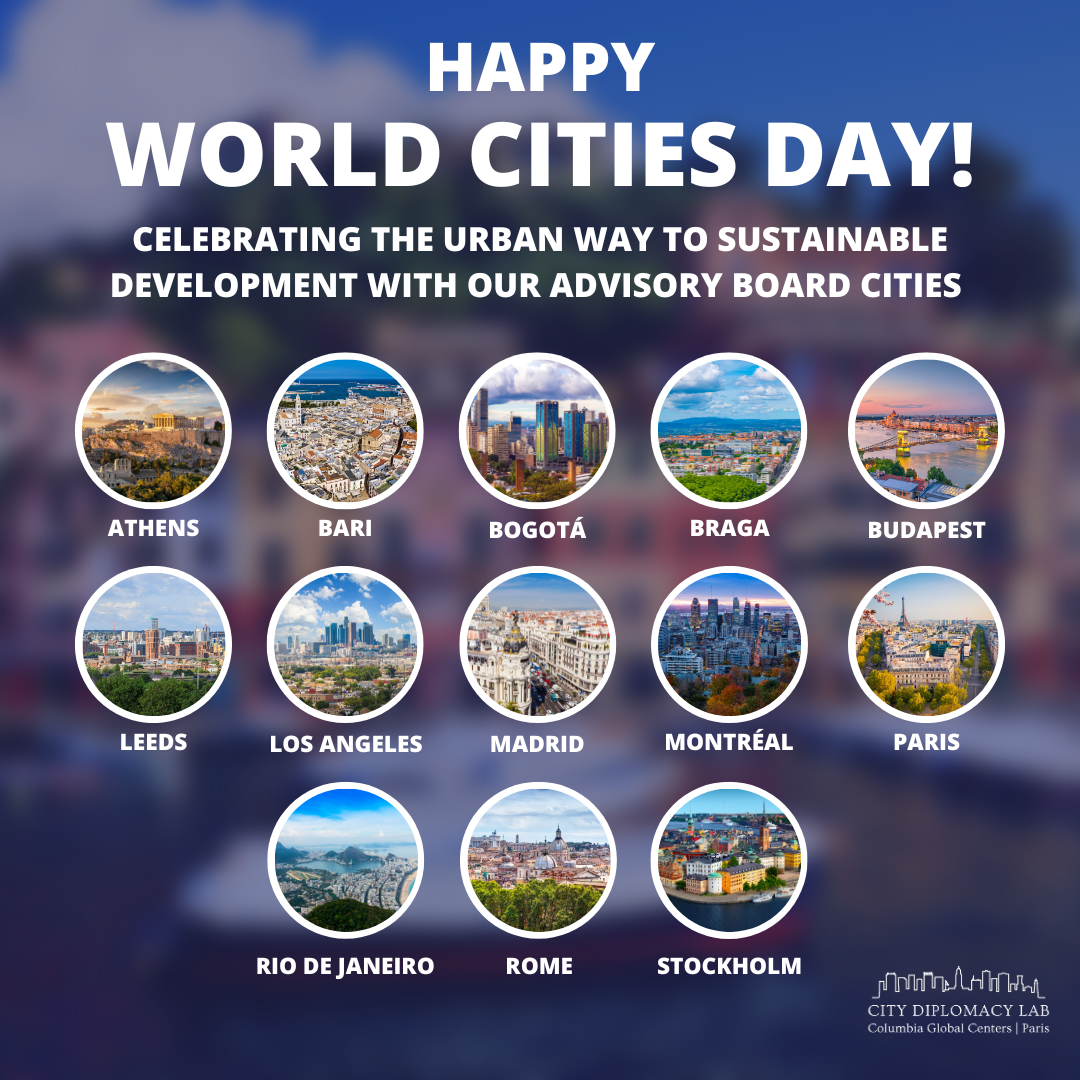
Climate change, migration, inequalities, epidemics, armed violence: everywhere in the world, cities have an enormous responsibility to manage today’s major challenges.
On World Cities Day, the City Diplomacy Lab wishes to celebrate the inspiring leadership of its Advisory Board cities, whose daily work demonstrates how to effectively address these challenges through participatory, innovative, and impactful international synergies. The work ahead is vast, but such is the impact of city diplomacy. Happy World Cities Day to all!
The City Diplomacy Lab team
-
Montpellier to host the Euro-Africa Water Days

Montpellier is hosting a two-day summit to review and debate water-related challenges faced by African and European cities – and their most innovative solutions.
The Euro-Africa Water Days, to which the City Diplomacy Lab at Columbia Global Centers | Paris is a scientific partner, will be held on October 9 and 10 in Montpellier, France.
Representatives from international organizations, nations, local governments, cities, academia, civil society organizations, and businesses from Africa and Europe will discuss the challenges and opportunities related to local water management. Plenary and roundtable topics include peace, governance, gender, climate risks, urbanization, and urban and peri-urban agriculture. Discussions will be held in French.
The Water Days are hosted by the City and Metropolitan Governments of Montpellier. They are part of the Euro-Africa Montpellier Biennial (October 9–15), featuring more than 70 initiatives to discuss the present and future of cultural, scientific, and economic cooperation between Europe and Africa.
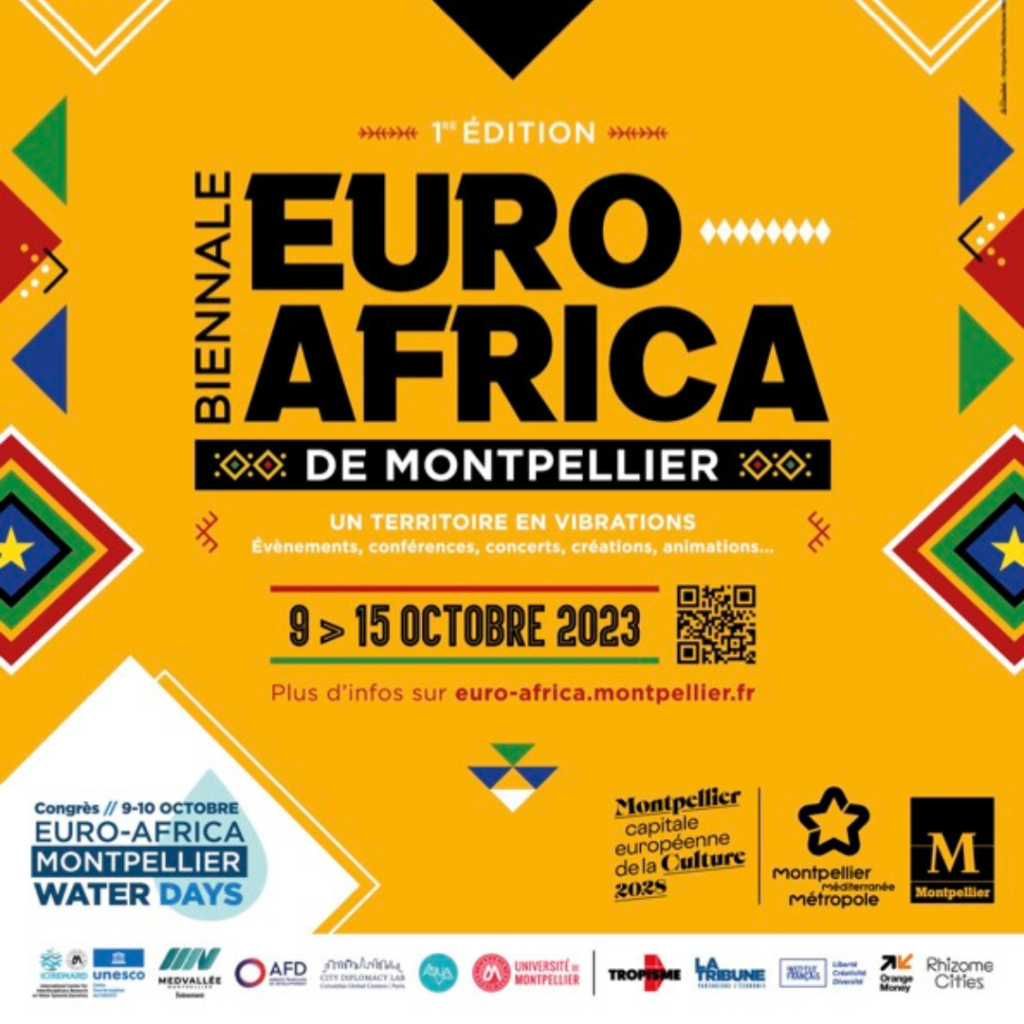
-
Flourishing African Cities: a program for undergraduate students worldwide
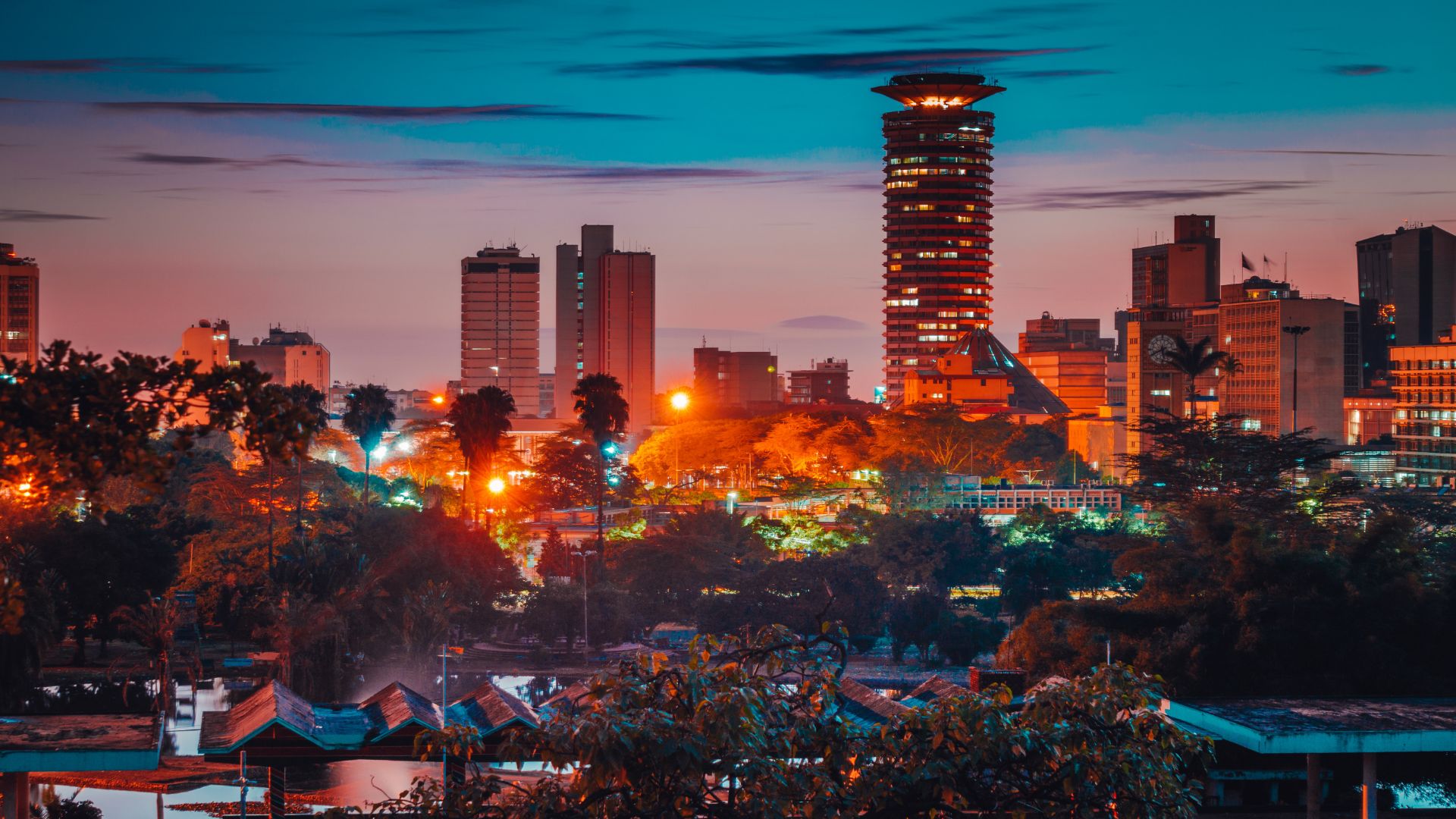
The Fall 2023 Global Columbia Collaboratory Flourishing African Cities: Urban Development, Food Systems, and Clean Energy is a free, not-for-credit, virtual global program exploring African cities’ path toward sustainability and resilience. The program welcomes currently enrolled undergraduate students from around the world.
Through seminars, working groups, and interactive sessions with NGOs working in the field, students will reflect, ideate, and collaborate to learn, discuss, and raise awareness about innovative ways African cities address global challenges and local priorities.
Applications are now open until Friday, September 8, 2023, and reviewed on a rolling basis until the program is full.
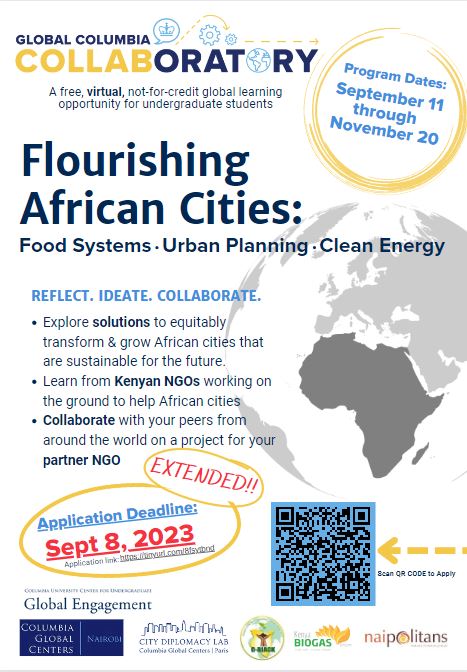
Apply here
The Fall 2023 Collaboratory is offered by Columbia University’s Center for Undergraduate Global Engagement in partnership with Columbia Global Centers | Nairobi and the City Diplomacy Lab.
-
Urban peace dialogues at the 2023 UNECE Forum of Mayors

An official side event to the 2023 UNECE Forum of Mayors, this international initiative aims to discuss and energize cities’ engagement to achieve SDG 16.
The City Diplomacy Lab at Columbia Global Centers | Paris, the United States Mission to the United Nations and Other International Organizations in Geneva, the Nicosia Initiative promoted by the European Committee of the Regions, and the European and French Chapters of Mayors for Peace are hosting an official side event to the 2023 UNECE Forum of Mayors.
The event, entitled “Urban Peace Dialogues: When Mayors Become Architects of Peace,” is scheduled for October 3 from 13:15 to 14:45 at the H200 auditorium at the Palace of Nations in Geneva. As the title suggests, the event’s primary goal is to initiate a global conversation to identify and discuss the unique added value of mayors and municipalities in achieving and maintaining peace and stability.
Moreover, the event intends to kickstart a global review of the role of cities in the achievement of SDG 16 and their consequential integration in international efforts for peaceful coexistence.
The goals of the event include:
- To foster multilevel dialogue on urban violence and conflict prevention.
- To raise awareness related to the innovative value of conflict prevention practices in urban areas.
- To create a united front of cities actively involved in participatory conflict prevention practices.
Program
Date: October 3, 2023, at 13:15 – 14:45 CEST
Place: H200 Auditorium, Palace of Nations, Geneva
Language: English
Opening remarks:
- Mr. Peter B. Kahn, Associate Deputy Assistant Secretary, U.S. Department of Housing and Urban Development
Round table (in alphabetical order):
- Ms. Alba Barnusell, Mayor of Granollers and Chair of Mayors for Peace’s European Chapter
- Mr. Mathias De Clercq, Mayor of Ghent and Vice President of Eurocities
- Mr. Albertino Ramaël, Deputy Mayor of Vitry-sur-Seine and representative of Mayors for Peace’s French Chapter
- Mr. Ricardo Rio, Mayor of Braga
- Ms. Katrin Stjernfeldt Jammeh, Mayor of Malmö
- Dr. Tobia Zevi, Deputy Mayor of Rome
Q&A session, opened by Ms. Benedetta Oddo, Coordinator, Nicosia Initiative
Closing remarks:
- Dr. Lorenzo Kihlgren Grandi, Founding Director, City Diplomacy Lab at Columbia Global Centers | Paris
Watch the recording
Gallery
The event is part of the activities of the City Diplomacy Lab as a UNECE Center of Excellence on City Diplomacy and Sustainable Urban Development and a continuation of the roundtable it organized in April 2022 at the Palais des Nations in partnership with the Permanent Missions of the United States and Italy.
-
A new partnership to empower South African cities through city diplomacy

The City Diplomacy Lab and the South African Cities Network (SACN) join forces to advance sustainable urban development in South Africa.
Over the past two decades, South Africa has emerged as a driver of city diplomacy on a global scale due to institutional innovation by its municipalities, the quality of its scholarly debate on the subject, as well as the support of national and international city networks.
Hence, South Africa stands out for the level of awareness that city diplomacy can and should play a primary role in the current conjuncture characterized by the acute local impact of overlapping global crises.
To enable SACN’s members to fully deploy city diplomacy’s unique political, technical, and financial resources, the City Diplomacy Lab has developed a tailored capacity-building program for them.
This highly interactive program is being held from June to August 2023. It will enable participating cities to develop their practical skills in making city diplomacy a cross-cutting municipal tool for sustainable urban development, with thematic insights related to just transition and economic development.
About the City Diplomacy Lab
Launched in September 2021, the City Diplomacy Lab is a special project of Columbia Global Centers | Paris. The Lab fosters the understanding and practice of city diplomacy, which forges international collaborations between cities to promote sustainable development and peace while providing responses to challenges such as climate change, rising inequality, and migration.
The Lab’s work, which includes applied research, capacity development, and event organization, has been officially recognized by the United Nations Regional Commission for Europe (UNECE) and awarded the designation of Center of Excellence on City Diplomacy and Sustainable Urban Development.
In addition to the UN, the Lab engages on a daily basis with multiple municipalities around the world, city networks, universities, and other international organizations. The Lab also benefits from the resources of the network of 11 Columbia Global Centers around the world.
For more information on City Diplomacy Lab capacity development programs, please visit this page.
About the South African Cities Network (SACN)
The South African Cities Network (SACN) was established in 2002 as a network of South African cities and partners that encourages the exchange of information, experience, and best practice on urban development and city management. Working together with South African cities and partners through research, knowledge sharing, peer learning, and innovation, the SACN is at the forefront of efforts to achieve the urban futures vision outlined in the Integrated Urban Development Framework [IUDF] and the National Development Plan [NDP].
The SACN’s overall mandate is to:
- Promote Good Governance and Management in South African cities
- Analyze strategic challenges facing South African cities, particularly in the context of global economic integration and national development challenges
- Collect, collate, analyze, assess, disseminate, and apply the experience of large city government in a South African context
- Promote shared-learning partnerships between different spheres of Government to support the management of South African cities
For more information about SACN, please visit www.sacities.net.
